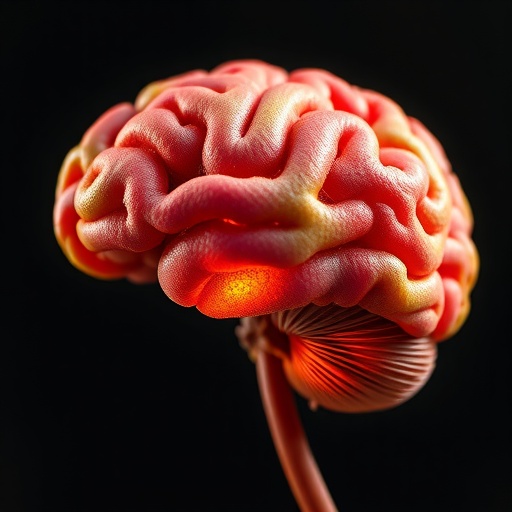In a groundbreaking shift within the field of developmental neuroscience, Dr. Alex Tsompanidis of the University of Cambridge is bringing the placenta to the forefront of human neurodevelopmental research. Challenging long-standing paradigms that have treated the placenta as a mere supportive organ during pregnancy, Tsompanidis’ work suggests that this vital organ is intricately involved in shaping the architecture and function of the human brain. His pioneering hypothesis introduces a placental-brain axis as a foundational framework for understanding not only typical and atypical brain development but also the evolutionary origins of human cognition and neurodiversity.
At the heart of Tsompanidis’s research lies the concept that the placenta, far from being simply a passive conduit of nutrients and oxygen, actively synthesizes steroid hormones such as testosterone and estrogens. These hormones traverse the fetal environment, influencing critical developmental processes in the brain’s neural circuitry. It is this hormonally mediated communication, he argues, that contributes to the sexual dimorphism often observed in neurodevelopmental outcomes, including the higher prevalence of autism spectrum conditions in males. This paradigm reframes neurodevelopmental disorders as emergent properties of complex prenatal biological interactions mediated by the placenta.
Tsompanidis’s research extends into evolutionary anthropology, where he proposes that adaptations in placental hormone production were essential in enabling the development of the uniquely large and highly interconnected human brain. The placenta’s regulatory role in modulating the prenatal hormonal milieu may have facilitated enhanced cognitive capabilities, linguistic complexity, and sophisticated social behaviors—traits that distinguish humans from other primates. This evolutionary perspective reveals not just how neurodevelopmental trajectories are constructed but also how they have been sculpted over millennia by placental biology.
The implications of this work ripple far beyond theoretical science, opening new translational avenues within clinical neurology and developmental diagnostics. Because the placenta is accessible immediately at birth, Tsompanidis envisions a future where placental biomarkers could serve as early indicators for neurodevelopmental risks, enabling timely interventions that support children exhibiting developmental differences. Such screening protocols could revolutionize early diagnosis, providing families and clinicians with critical tools long before behavioral symptoms traditionally signal developmental concerns.
Tracing his scientific journey from a childhood in Athens marked by microscopy experiments to leadership roles in collaborative international consortia, Tsompanidis embodies a multidisciplinary approach fundamental to the innovation in his field. His research groups integrate cutting-edge techniques ranging from genetic sequencing and molecular pathway analysis to neuroimaging and behavioral assessments. These multilayered investigations elucidate biological threads linking prenatal complications to later neurodevelopmental outcomes, particularly spotlighting the sex differences that are prominent in conditions such as autism.
A defining inspiration in Tsompanidis’s career was a clinical encounter with a nonverbal autistic child during his medical training in Greece. Witnessing the mother’s frustration amidst limited scientific knowledge motivated Tsompanidis to dedicate himself to uncovering the complex biological underpinnings of neurodevelopmental diversity. This personal connection fuels his commitment to research that transcends reductionist medical models, favoring a holistic understanding that recognizes autism as an integral component of human neurodiversity rather than a pathologized anomaly.
His collaboration with notable figures such as Professor Sir Simon Baron-Cohen has fortified this expansive vision, combining obstetrics, evolutionary biology, and neuroscience to build a cohesive model that connects genetic, molecular, anatomical, and behavioral data. This integrative strategy reveals how prenatal sex hormones and placental function converge with genetic predispositions to influence neurodevelopmental trajectories, providing crucial insights into the mechanisms driving both typical cognitive development and neurodevelopmental conditions.
Beyond the laboratory, Tsompanidis is a vocal advocate for inclusive science and global collaboration. He highlights systemic barriers to participation faced by international researchers and urges the scientific community to broaden its focus to encompass neglected fields such as women’s reproductive health. His advocacy for increased research into conditions like endometriosis and polycystic ovary syndrome aligns with his broader ethos of empowering diverse voices within science, aiming to enrich the collective understanding of human biology and medicine.
Mentorship remains a cornerstone of Tsompanidis’s career, reflecting both his personal trajectory and his dedication to fostering the next generation of scientists across continents and disciplines. Through his leadership at the Autism Research Centre in Cambridge, he nurtures a vibrant intellectual community that pursues questions spanning from neural development to human evolution. This environment embodies his belief that science thrives on collaborative exchange and the breaking down of traditional academic silos.
Perhaps most compelling is Tsompanidis’s call for autism research that fully incorporates the perspectives and experiences of autistic individuals. He asserts that bridging lived experience with clinical and basic scientific research is crucial for producing culturally sensitive, socially relevant knowledge. This inclusive approach promises to reshape research priorities, ensuring they align with the needs and values of neurodiverse communities worldwide.
As the role of the placenta gains recognition as a pivotal orchestrator of neurodevelopment, Dr. Tsompanidis’s work stands at the vanguard of a transformative era. By elucidating how prenatal biology and evolution intertwine to shape brain diversity, his research not only deepens scientific understanding but also charts a hopeful path toward early diagnosis, personalized support, and societal acceptance for millions of families affected by neurodevelopmental conditions.
This narrative unfolded in a recent Genomic Press interview published in Brain Medicine, where Tsompanidis passionately conveyed the promise and challenges inherent to this evolving scientific frontier. His pioneering insights signal an urgent shift in neuroscience—one that leverages the placenta’s hidden complexities to unlock new horizons in brain research, human development, and evolutionary biology.
Subject of Research: People
Article Title: Alex Tsompanidis: Understanding the role of the placenta in human neurodevelopment
News Publication Date: 16-Sep-2025
Web References: https://doi.org/10.61373/bm025k.0110
Image Credits: Alex Tsompanidis, MD, PhD
Tags: Cambridge University neurosciencedevelopmental neuroscience breakthroughsDr. Alex Tsompanidis researchevolutionary origins of human cognitionhormonal influence on brain developmentNeurodevelopmental Disordersneurodiversity and brain evolutionplacental research and autismplacental-brain axisprenatal biological interactionssexual dimorphism in neurodevelopmentsteroid hormones in pregnancy





